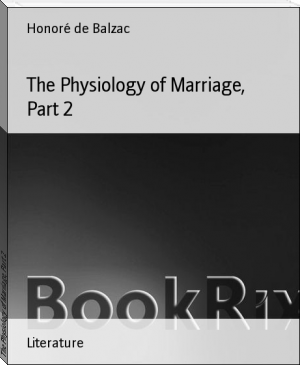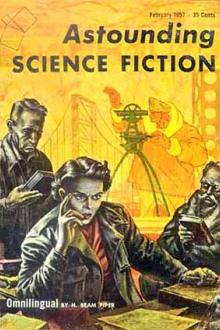The Physiology of Marriage, Part 1 - Honoré de Balzac (english novels to improve english .txt) 📗

- Author: Honoré de Balzac
Book online «The Physiology of Marriage, Part 1 - Honoré de Balzac (english novels to improve english .txt) 📗». Author Honoré de Balzac
What a startling conclusion!
On this point the purist in morality, the _collets montes_ will accuse us perhaps of presenting here conclusions which are excessively despairing; they will be desirous of putting up a defence, either for the virtuous women or the celibates; but we have in reserve for them a final remark.
Increase the number of honest women and diminish the number of celibates, as much as you choose, you will always find that the result will be a larger number of gallant adventurers than of honest women; you will always find a vast multitude driven through social custom to commit three sorts of crime.
If they remain chaste, their health is injured, while they are the slaves of the most painful torture; they disappoint the sublime ends of nature, and finally die of consumption, drinking milk on the mountains of Switzerland!
If they yield to legitimate temptations, they either compromise the honest women, and on this point we re-enter on the subject of this book, or else they debase themselves by a horrible intercourse with the five hundred thousand women of whom we spoke in the third category of the first Meditation, and in this case, have still considerable chance of visiting Switzerland, drinking milk and dying there!
Have you never been struck, as we have been, by a certain error of organization in our social order, the evidence of which gives a moral certainty to our last calculations?
The average age at which a man marries is thirty years; the average age at which his passions, his most violent desires for genesial delight are developed, is twenty years. Now during the ten fairest years of his life, during the green season in which his beauty, his youth and his wit make him more dangerous to husbands than at any other epoch of his life, his finds himself without any means of satisfying legitimately that irresistible craving for love which burns in his whole nature. During this time, representing the sixth part of human life, we are obliged to admit that the sixth part or less of our total male population and the sixth part which is the most vigorous is placed in a position which is perpetually exhausting for them, and dangerous for society.
"Why don't they get married?" cries a religious woman.
But what father of good sense would wish his son to be married at twenty years of age?
Is not the danger of these precocious unions apparent at all? It would seem as if marriage was a state very much at variance with natural habitude, seeing that it requires a special ripeness of judgment in those who conform to it. All the world knows what Rousseau said: "There must always be a period of libertinage in life either in one state or another. It is an evil leaven which sooner or later ferments."
Now what mother of a family is there who would expose her daughter to the risk of this fermentation when it has not yet taken place?
On the other hand, what need is there to justify a fact under whose domination all societies exist? Are there not in every country, as we have demonstrated, a vast number of men who live as honestly as possible, without being either celibates or married men?
Cannot these men, the religious women will always ask, abide in continence like the priests?
Certainly, madame.
Nevertheless, we venture to observe that the vow of chastity is the most startling exception to the natural condition of man which society makes necessary; but continence is the great point in the priest's profession; he must be chaste, as the doctor must be insensible to physical sufferings, as the notary and the advocate insensible to the misery whose wounds are laid bare to their eyes, as the soldier to the sight of death which he meets on the field of battle. From the fact that the requirements of civilization ossify certain fibres of the heart and render callous certain membranes, we must not necessarily conclude that all men are bound to undergo this partial and exceptional death of the soul. This would be to reduce the human race to a condition of atrocious moral suicide.
But let it be granted that, in the atmosphere of a drawing-room the most Jansenistic in the world, appears a young man of twenty-eight who has scrupulously guarded his robe of innocence and is as truly virginal as the heath-cock which gourmands enjoy. Do you not see that the most austere of virtuous women would merely pay him a sarcastic compliment on his courage; the magistrate, the strictest that ever mounted a bench, would shake his head and smile, and all the ladies would hide themselves, so that he might not hear their laughter? When the heroic and exceptional young victim leaves the drawing-room, what a deluge of jokes bursts upon his innocent head? What a shower of insults! What is held to be more shameful in France than impotence, than coldness, than the absence of all passion, than simplicity?
The only king of France who would not have laughed was perhaps Louis XIII; but as for his roue of a father, he would perhaps have banished the young man, either under the accusation that he was no Frenchman or from a conviction that he was setting a dangerous example.
Strange contradiction! A young man is equally blamed if he passes life in Holy Land, to use an expression of bachelor life. Could it possibly be for the benefit of the honest women that the prefects of police, and mayors of all time have ordained that the passions of the public shall not manifest themselves until nightfall, and shall cease at eleven o'clock in the evening?
Where do you wish that our mass of celibates should sow their wild oats? And who is deceived on this point? as Figaro asks. Is it the governments or the governed? The social order is like the small boys who stop their ears at the theatre, so as not to hear the report of the firearms. Is society afraid to probe its wound or has it recognized the fact that evil is irremediable and things must be allowed to run their course? But there crops up here a question of legislation, for it is impossible to escape the material and social dilemma created by this balance of public virtue in the matter of marriage. It is not our business to solve this difficulty; but suppose for a moment that society in order to save a multitude of families, women and honest girls, found itself compelled to grant to certain licensed hearts the right of satisfying the desire of the celibates; ought not our laws then to raise up a professional body consisting of female Decii who devote themselves for the republic, and make a rampart of their bodies round the honest families? The legislators have been very wrong hitherto in disdaining to regulate the lot of courtesans.
XXIII. The courtesan is an institution if she is a necessity.
This question bristles with so many ifs and buts that we will bequeath it for solution to our descendants; it is right that we shall leave them something to do. Moreover, its discussion is not germane to this work; for in this, more than in any other age, there is a great outburst of sensibility; at no other epoch have there been so many rules of conduct, because never before has it been so completely accepted that pleasure comes from the heart. Now, what man of sentiment is there, what celibate is there, who, in the presence of four hundred thousand young and pretty women arrayed in the splendors of fortune and the graces of wit, rich in treasures of coquetry, and lavish in the dispensing of happiness, would wish to go--? For shame!
Let us put forth for the benefit of our future legislature in clear and brief axioms the result arrived at during the last few years.
XXIV. In the social order, inevitable abuses are laws of nature, in accordance with which mankind should frame their civil and political institutes.
XXV. "Adultery is like a commercial failure, with this difference," says Chamfort, "that it is the innocent party who has been ruined and who bears the disgrace."
In France the laws that relate to adultery and those that relate to bankruptcy require great modifications. Are they too indulgent? Do they sin on the score of bad principles? _Caveant consules_!
Come now, courageous athlete, who have taken as your task that which is expressed in the little apostrophe which our first Meditation addresses to people who have the charge of a wife, what are you going to say about it? We hope that this rapid review of the question does not make you tremble, that you are not one of those men whose nervous fluid congeals at the sight of a precipice or a boa constrictor! Well! my friend, he who owns soil has war and toil. The men who want your gold are more numerous than those who want your wife.
After all, husbands are free to take these trifles for arithmetical estimates, or arithmetical estimates for trifles. The illusions of life are the best things in life; that which is most respectable in life is our futile credulity. Do there not exist many people whose principles are merely prejudices, and who not having the force of character to form their own ideas of happiness and virtue accept what is ready made for them by the hand of legislators? Nor do we address those Manfreds who having taken off too many garments wish to raise all the curtains, that is, in moments when they are tortured by a sort of moral spleen. By them, however, the question is boldly stated and we know the extent of the evil.
It remains that we should examine the chances and changes which each man is likely to meet in marriage, and which may weaken him in that struggle from which our champion should issue victorious.
MEDITATION V.
OF THE PREDESTINED.
Predestined means destined in advance for happiness or unhappiness. Theology has seized upon this word and employs it in relation to the happy; we give to the term a meaning which is unfortunate to our elect of which one can say in opposition to the Gospel, "Many are called, many are chosen."
Experience has demonstrated that there are certain classes of men more subject than others to certain infirmities; the Gascons are given to exaggeration and Parisians to vanity. As we see that apoplexy attacks people with short necks, or butchers are liable to carbuncle, as gout attacks the rich, health the poor, deafness kings, paralysis administrators, so it has been remarked that certain classes of husbands and their wives are more given to illegitimate passions. Thus they forestall the celibates, they form another sort of aristocracy. If any reader should be enrolled in one of these aristocratic classes he will, we hope, have sufficient presence of mind, he or at least his wife, instantly to call to mind the favorite axiom of Lhomond's Latin Grammar: "No rule without exception." A friend of the house may even recite the verse--
"Present company always excepted."
And then every one will have the





Comments (0)